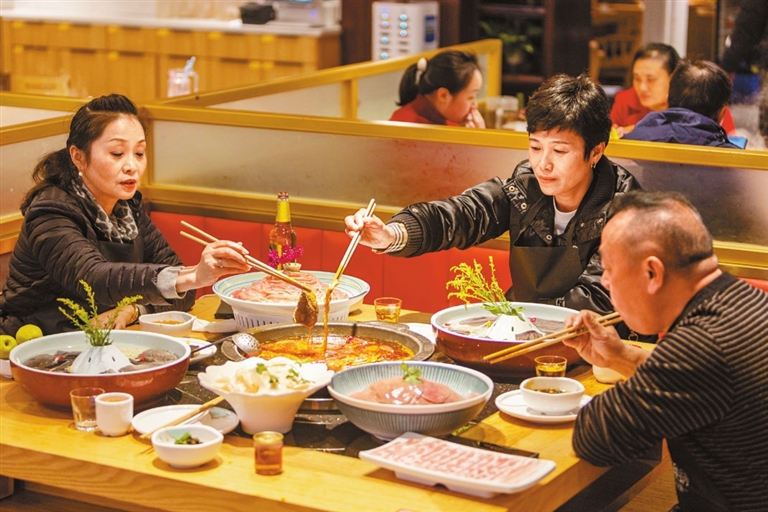
WANG WENJUN, who has cooked hotpot for 26 years in Southwest China’s Chongqing Municipality, posted on social media recently that his occupation is now classified according to a national standard. “Relevant authorities are planning and designing qualification exams according to the standard,” said Wang, adding that a practitioner can be certified as a “hotpot chef” after passing the examination. The job of hotpot chef was recognized in the 2022 edition of the occupational classification code of China. The new standard further specifies the profession’s definition, skill ranks and vocational training requirements, among others, jointly published in February by Ministry of Human Resources and Social Security and the Ministry of Commerce. Chongqing, which is renowned for its spicy hotpots, took the lead in formulating the standard. In the municipality, there were about 32,000 hotpot restaurants as of last September, while the total output of the hotpot industry chain reached 300 billion yuan (US$42.3 billion) in 2022, according to a press release. However, some people once feared that the formulation of the standard might be biased, as the spicy flavor of Chongqing is different from that of various regions across China, such as Beijing mutton hotpot and Guangdong seafood hotpot. “It is a national professional standard and should not be confined to a single place,” noted Li Jianfeng, deputy secretary general of the China Hospitality Association when supervising the formulation of the standard. Hence experts conducted field investigations in more than 20 cities in China, where experienced hotpot cooks shared their ideas. As a member of the standard’s formulation group, Wang said, “Though hotpots have different flavors, there are common cooking procedures such as picking ingredients and choosing appropriate temperatures.” He added that hotpots are classified into six categories, which can apply to most varieties of hotpots in China. Wang added that in addition to blending hotpot seasoning skills, the standard requires chefs to have relevant knowledge of cooking, including food safety and nutrition. According to Wang Huayuan, deputy director of the vocational skills assessment and guidance center of Chongqing, relevant hotpot training courses will be launched, textbooks for hotpot chefs will be developed, and hotpot chefs will be determined at five levels through exams. “Previously, it was not easy to find a teacher who wanted to teach us how to cook hotpot. But soon, we will be able to access more hotpot cooking courses such as online ones,” said Xu Gaoyuan, a hotpot apprentice from Chongqing. “I can’t wait to attend the training and sign up for the qualification exam,” Xu said. (Xinhua) | 
